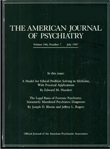Reduction of CO2-induced anxiety in patients with panic attacks after repeated CO2 exposure
Abstract
The authors compared the subjective reaction of 13 panic patients and eight control subjects to a 35% CO2 challenge, a treatment known to produce physical symptoms comparable to those of natural or lactate- induced panic, and to placebo treatment (inhalation of air). They found that patients had higher placebo scores than control subjects, patients tended to get highly anxious on CO2 and control subjects did not, and CO2-induced subjective anxiety in patients decreased as the number of CO2-induced exposures to interoceptive anxiety symptoms increased. The data support a behavioral account of the effects of anxiogenics.
Access content
To read the fulltext, please use one of the options below to sign in or purchase access.- Personal login
- Institutional Login
- Sign in via OpenAthens
- Register for access
-
Please login/register if you wish to pair your device and check access availability.
Not a subscriber?
PsychiatryOnline subscription options offer access to the DSM-5 library, books, journals, CME, and patient resources. This all-in-one virtual library provides psychiatrists and mental health professionals with key resources for diagnosis, treatment, research, and professional development.
Need more help? PsychiatryOnline Customer Service may be reached by emailing [email protected] or by calling 800-368-5777 (in the U.S.) or 703-907-7322 (outside the U.S.).



